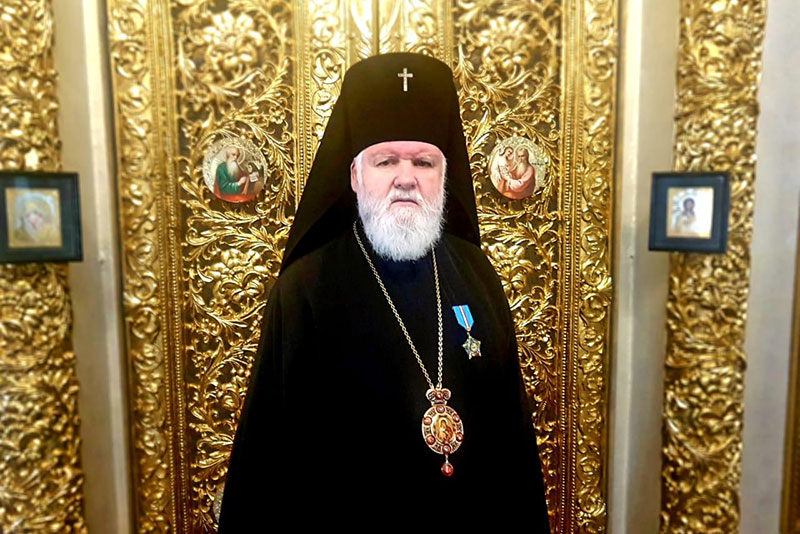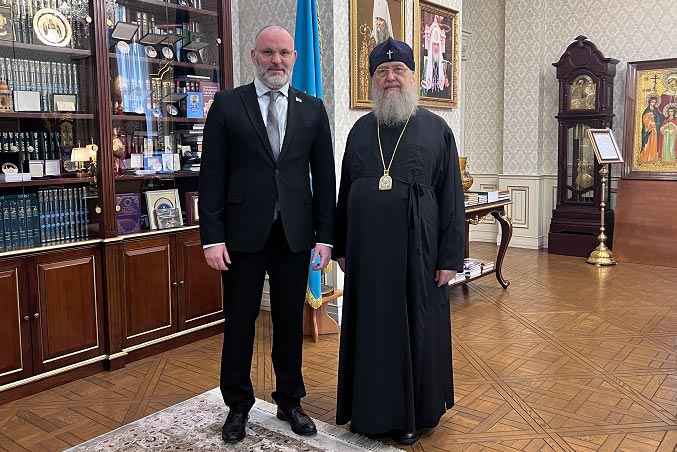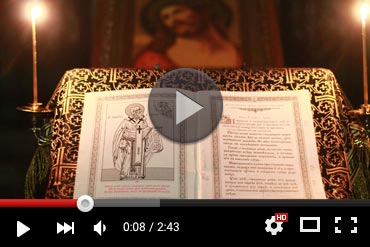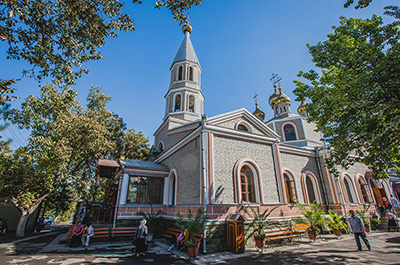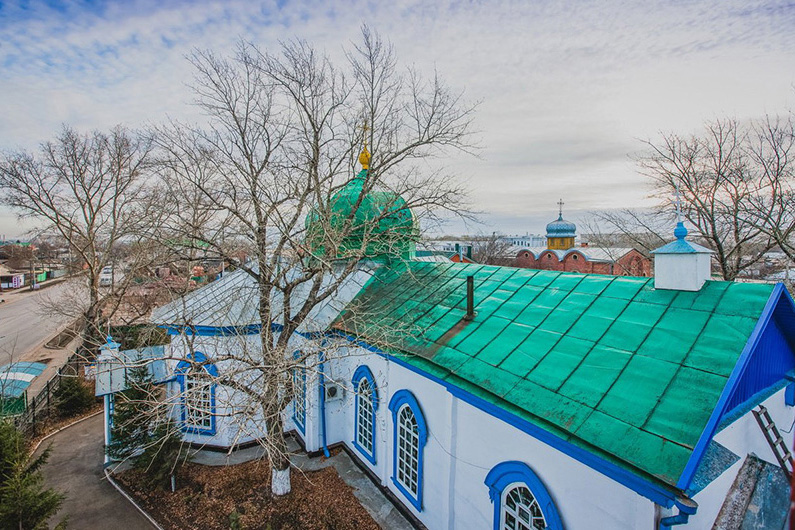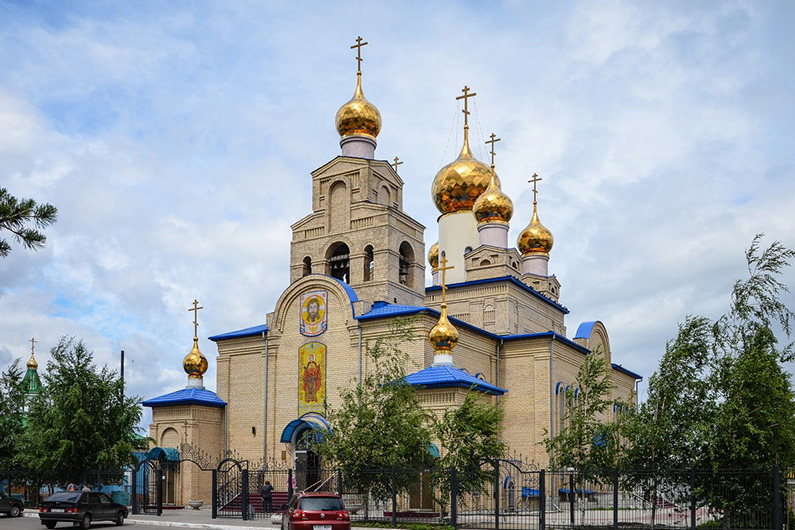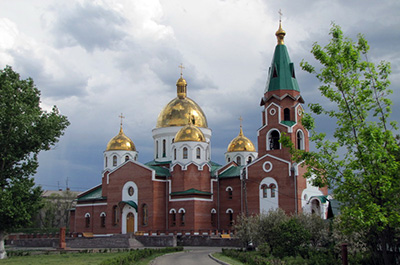
On the Feast of the Circumcision of the Lord and the day of remembrance of St. Basil the Great, Metropolitan Alexander celebrated the Liturgy at the Assumption Cathedral in Astana
- 15.01.2024, 16:30
- Новости на английском языке

January 14, 2024 – 32nd week after Pentecost, before Epiphany; the feast of the Circumcision of our Lord Jesus Christ and the day of remembrance of the great hierarch and universal teacher - St. Basil the Great, Archbishop of Caesarea in Cappadocia.
Metropolitan Alexander of Astana and Kazakhstan performed the Divine Liturgy in the main church of the country - the Assumption Cathedral in Astana.
The head of the Orthodox Church of Kazakhstan was co-served by: dean of the Astana church district Archimandrite Sergius (Karamyshev), rector of the temple in honor of the icon of the Mother of God “Joy of All Who Sorrow” Archpriest Evgeniy Vorobyov, cleric of the Assumption Cathedral of the city of Astana Archpriest Dimitry Baidek, cleric of the Church of St. Seraphim of Sarov in the city of Astana hieromonk Siluan (Sinegubov), Priest Sergius Lubnevsky, Priest Sergius Pinigin, head of the personal secretariat of the Head of the Metropolitan District, Hieromonk Prokhor (Endovitsky); Protodeacon Nikolai Grinkevich, head of the Metropolitan Protocol Service, Protodeacon Roman Golovin, Protodeacon Vladimir Syrovatsky, Deacon Ilya Davydov, Deacon Mikhail Chumakov, Deacon Ioann Churkin, Deacon Bogdan Boyko.
With the blessing of Metropolitan Alexander, the ark was delivered from the Iversko-Seraphim house church of the metropolitan residence in Almaty to the main church of the capital for the prayerful worship of believers, with the relics of the Venerable Seraphim of Sarov, part of the stone on which the venerable elder prayed for a thousand days and nights, a lock of the saint’s hair, as well as parts of his clothes and vestments.
During the reading of the hours, Metropolitan Alexander tonsured Kirill Bondar, a fourth-year student at the correspondence department of the Alma-Ata Theological Seminary, as a reader.
The chants were performed by the cathedral choir under the direction of Olga Varentsova.
The Hierarch offered prayers for the increase of love and the eradication of all hatred and malice.
After the Eucharistic Canon, Metropolitan Alexander performed the diaconal ordination of Reader Kirill Bondar.
The sermon on the sacramental verse was delivered by Hieromonk Siluan (Sinegubov).
At the end of the Liturgy, glorification took place to the Feast of the Circumcision of the Lord and to St. Basil with prayers for the beginning of the New Year and to the Cappadocian hierarch.
After the proclamation of many years, the bishop addressed those gathered with an archpastoral sermon, in which he spoke about the life and works of St. Basil the Great and revealed the spiritual meaning of the Feast of the Circumcision of the Lord.
For reverent storage and prayerful worship, the Head of the Metropolitan District donated to the Assumption Cathedral a woven image of the Kursk-Root Icon of the Mother of God “The Sign,” which served as the robe of the miraculous shrine. Archimandrite Sergius (Karamyshev) accepted the image of the Queen of Heaven from the hands of Metropolitan Alexander.
“On the eighth day after the Nativity of Christ, the Circumcision of our Lord Jesus Christ is celebrated and the great hierarch and universal teacher, St. Basil the Great, is prayerfully glorified. Each gospel event is called sacred because it took place for the sake of the sanctification and salvation of the human race. The Church commemorates these events in order to instill in us a desire for God, for the truth, to inspire us to live a righteous life. Our Savior, according to the Old Testament law, accepted circumcision, established for all male infants as a sign of the Covenant of God with the forefather Abraham and his descendants. During the performance of this rite, the Divine Infant was given the name Jesus, announced by the Archangel Gabriel on the day of the Annunciation to the Blessed Virgin Mary. The name Jesus translated means Savior. According to the interpretation of the Fathers of the Church, the Lord, the Creator of the Law, accepted circumcision, setting an example for people on how to strictly fulfill Divine ordinances. Another important meaning of the Lord's Circumcision is that it shows everyone the true humanity of Christ. His flesh was real, not illusory, as some heretics taught. In the New Testament, the rite of circumcision gave way to the sacrament of Baptism, of which it was a prototype.
Saint Basil the Great, Archbishop of Caesarea in Cappadocia - the great father and teacher of the Church - lived in the 4th century. While fulfilling his ministry, he preached zealously and tirelessly cared for the needs of his flock, thanks to which he gained high respect and great love of the people. In 370, Saint Basil was elected by the Council of Bishops to the See of Caesarea. In difficult times for the Church, he showed himself as a fiery defender of the Orthodox faith, protecting it from heresies with his words and messages. Basil the Great was an ascetic and man of prayer, the author of many theological works and the compiler of the rite of the Divine Liturgy, which is celebrated to this day by the Orthodox Church. For his services to the Orthodox Church, Saint Basil is called the Great and is glorified as “the glory and beauty of the Church,” “the luminary and eye of the universe,” “the teacher of dogmas,” “the chamber of learning.” He is the heavenly patron of the enlightener of Rus' - the holy Equal-to-the-Apostles Grand Duke Vladimir, named Vasily in Baptism. In one of his teachings, the saint gave us an important rule for communicating with people: “A wise man, when he eats grapes, eats sweet berries and leaves the unripe ones. In the same way, a virtuous person, when he looks at another person, pays attention to his virtues, but a stupid and reckless person pays attention to his sins.” Prayerfully commemorating St. Basil the Great, we will imitate his holy life, his strong faith and love for God, his complete devotion to holy Orthodoxy. Following the example of the saint, let us hasten to be true confessors of the faith of Christ, true Christians, not only in name, not in words, but in life itself.” From the sermon of Metropolitan Alexander.



